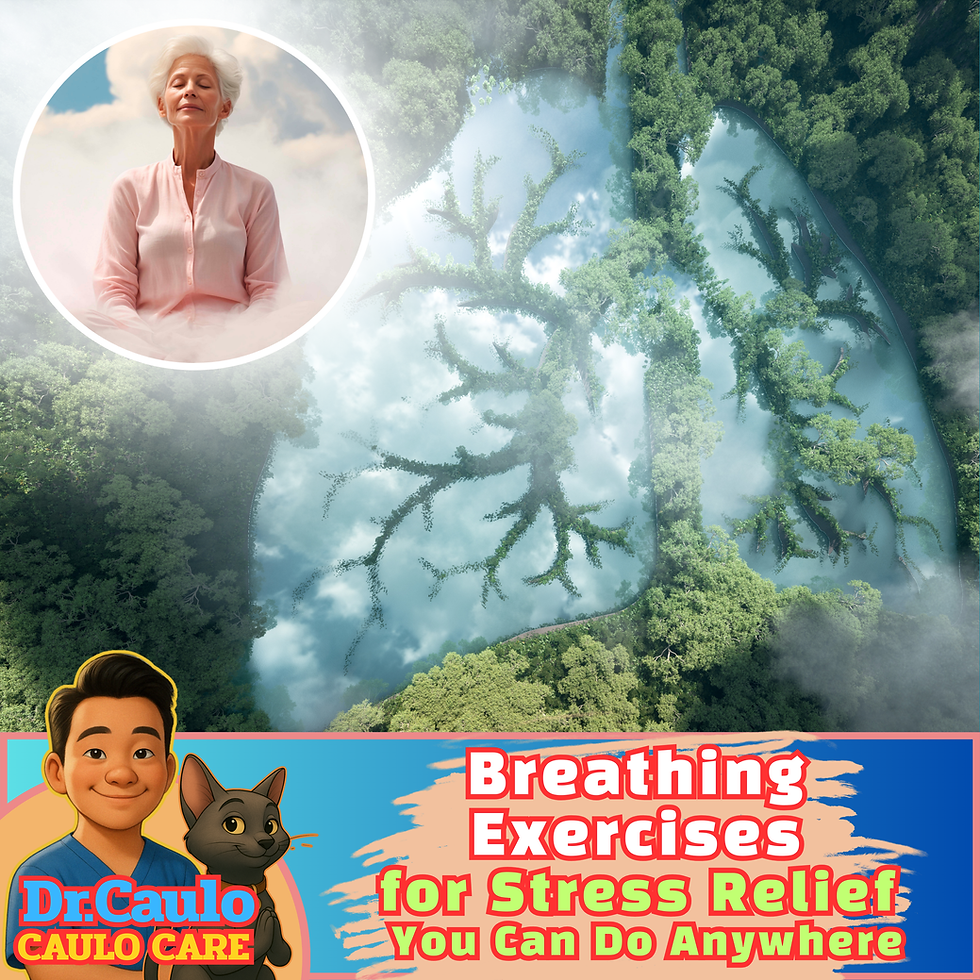Why Breathing the Right Way Matters: A Medical and TCM Perspective
- caulocare
- Aug 29, 2025
- 3 min read

By Dr. Phumlarp Caulo – Caulo Care Acupuncture, Forest Hills, New York
Introduction
Breathing is the most natural act we do every day—yet few people pause to think about how they breathe. The way we inhale and exhale influences every system in the body. From oxygen delivery and stress regulation to posture, energy levels, and digestion, proper breathing is the foundation of health.
Both modern medicine and Traditional Chinese Medicine (TCM) emphasize the importance of correct breathing. While the explanations differ—oxygen exchange versus Qi circulation—the conclusion is the same: learning how to breathe properly is essential for healing and long-term vitality.
At Caulo Care Acupuncture in Forest Hills, Queens, we guide patients in retraining their breathing patterns, correcting posture, and integrating acupuncture, herbal medicine, and natural remedies to restore balance and vitality.
The Western Medical Explanation
Anatomy & Physiology of Breathing
Breathing involves the diaphragm, intercostal muscles, lungs, and airway passages. When we practice diaphragmatic breathing, the lungs expand fully, oxygen exchange improves, and strain on the neck and chest muscles decreases.
Poor posture—such as slouching at a desk—restricts lung expansion. This leads to shallow chest breathing, reduced oxygen saturation, and activation of the sympathetic (“fight or flight”) nervous system. Over time, this can cause:
Fatigue and low energy
Anxiety and poor sleep
Tension headaches and stiff muscles
Poor circulation and sluggish digestion
Why Breathing the Wrong Way Harms Health
Shallow breathing → less oxygen to tissues → fatigue and brain fog
Overbreathing (hyperventilation) → low carbon dioxide → dizziness, tingling, and panic
Mouth breathing → dry airways → higher risk of asthma and infection
Practicing breathing exercises for stress and improving posture are simple but powerful tools to correct these issues.
The Traditional Chinese Medicine (TCM) View
In TCM, breath is inseparable from Qi (vital energy), with the Lungs considered the “tender organ” that governs both respiration and immune defense (Wei Qi). Correct breathing ensures smooth circulation of Qi and Blood throughout the body.
Shallow, weak breathing = Lung Qi deficiency → fatigue, sweating, low immunity
Rapid, anxious breathing = imbalance of Heart and Lung Qi → palpitations, insomnia, restlessness
Blocked or irregular breathing = Liver Qi stagnation → chest tightness, irritability, digestive issues
Posture is equally important in TCM. A collapsed chest or hunched back restricts the flow of Lung Qi, just as trapped emotions limit breathing. By correcting posture, the diaphragm and chest can open, restoring balance.
Treatment Approaches
Western Medicine
Breathing retraining: diaphragmatic breathing, pursed-lip breathing, yoga, and pulmonary rehab programs
Medications (if needed): bronchodilators, corticosteroids, or anti-anxiety medications for conditions like asthma, COPD, or panic disorder
Physical therapy: posture correction and strengthening of the diaphragm, core, and intercostal muscles
Traditional Chinese Medicine
Acupuncture for better breathing in NYC: Points such as LU-1, LU-9, ST-36, and Ren-17 regulate Lung Qi, relax chest tension, and calm anxiety.
Herbal medicine and lung health natural remedies:
Ren Shen (Ginseng) – tonifies Lung Qi, boosts vitality
Huang Qi (Astragalus) – strengthens Wei Qi and immune defense
Mai Men Dong (Ophiopogon root) – nourishes Yin and moistens the Lungs for dry cough
Breathing with posture correction: Practices such as qigong, tai chi, and mindful walking harmonize Qi and strengthen the body’s foundation.
Prevention and Self-Care
Practice daily diaphragmatic breathing: place one hand on your belly and one on your chest, and breathe so that your belly rises first.
Improve your posture: sit upright, relax your shoulders, and keep your chest open.
Stay active: movement promotes lung expansion and cardiovascular health.
Avoid triggers: smoking, pollution, and chronic stress impair both oxygen exchange and Lung Qi.
Support lung health naturally: pears, honey, chrysanthemum tea, ginger, and ginseng are among the best herbs for Lung Qi and can be integrated into the diet or herbal formulas.
Conclusion
Breathing properly is more than survival—it is medicine. Whether explained in terms of oxygen delivery or Qi circulation, correct breathing promotes healing, longevity, and emotional stability.
At Caulo Care Acupuncture in Forest Hills, Queens, we integrate modern medical techniques with Traditional Chinese Medicine to help patients naturally improve their breathing, reduce stress, and restore their quality of life.
This information is only educational and should not be construed as medical advice.
Everything must be balanced, and the suggestions may not apply to you.
A specialist doctor should be consulted for any medical advice or diagnosis.
Acupuncture near me at Forest Hill, NY
🔶🔷🔶🔷🔶🔷🔶🔷🔶🔷🔶🔷
Dr. Phumlarp Caulo LA,c, MAc. OM, DAHM
Doctor of Acupuncture/Chinese Medicine
Caulo Care Acupuncture
🔖 By appointment only
☎️+1 (929) 269-4549




Comments